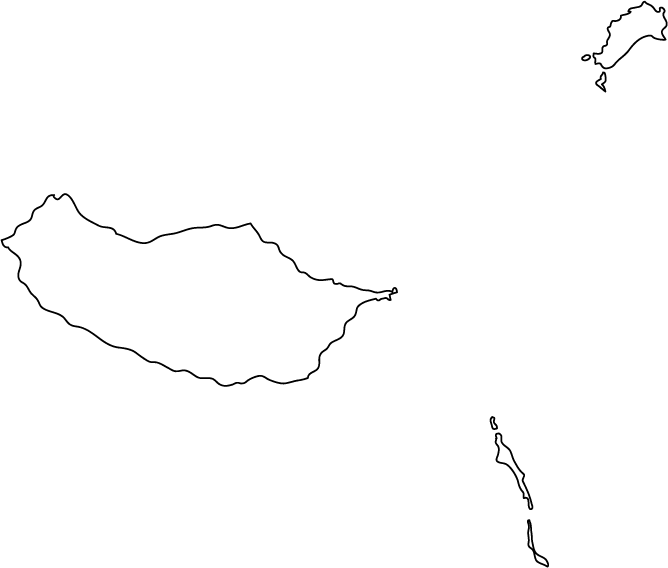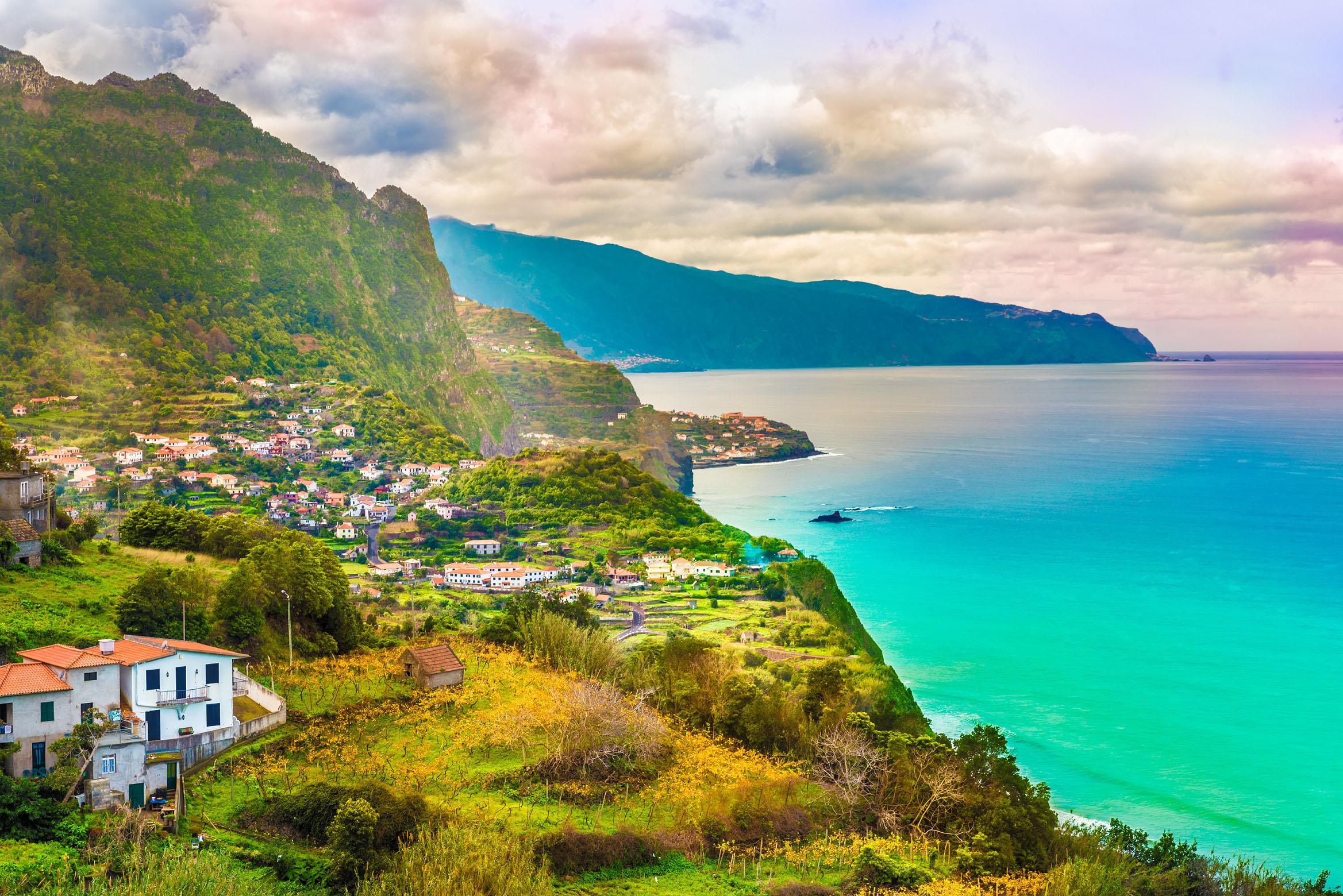ABOUT MADEIRA
Madeira was claimed by Portuguese sailors in the service of Prince Henry the Navigator in 1419 and settled after 1420. The archipelago is considered to be the first territorial discovery of the exploratory period of the Portuguese Age of Discovery, which extended from 1415 to 1542.
Today, it is a popular year-round resort, being visited every year by about one million tourists, three times its population. The region is noted for its Madeira wine, gastronomy, historical and cultural value, flora and fauna, landscapes (Laurel forest) which are classified as a UNESCO World Heritage Site, and embroidery artisans.
Its annual New Year celebrations feature the largest fireworks show in the world, as officially recognised by Guinness World Records in 2006. The main harbour in Funchal is the leading Portuguese port in cruise liner dockings, being an important stopover for commercial and trans-Atlantic passenger cruises between Europe, the Caribbean and North Africa. In addition, the International Business Centre of Madeira also known as the Madeira Free Trade Zone, was created formally in the 1980s as a tool of regional economic policy. It consists of a set of incentives, mainly tax-related, granted with the objective of attracting foreign direct investment based on international services into Madeira.
NON HABITUAL TAX RESIDENCE REGIME (NHR)
Portugal has what is called a non-habitual resident (NHR) tax regime. In effect, it is a program that allows qualifying individuals the opportunity to become tax residents of a “white-listed” jurisdiction and still legally eliminate their taxes on most foreign-source income.
The tax residency is good for 10 years and does not come with the typical obligation that you visit or live in Portugal part of the year to maintain your resident status there.
The biggest draw of the program is the opportunity to reduce your income tax to zero.
This is possible, in part, due to Portugal’s 71 double taxation treaties. According to the regime, as long as the source country of your income has the power to tax your income (regardless of whether or not they actually apply the tax), Portugal will not tax your foreign-sourced income.
The list of income sources that will not be taxed under this set-up includes foreign-source self-employment, royalties, eligible occupations, occupational pensions, capital gains and investment or rental income.
It is important to note that capital gains from the sale of securities will be taxed, as will income sourced from a blacklisted tax haven that does not have a double tax treaty with Portugal.
Finally, if you happen to have Portugal-sourced income, it will be taxed at a flat rate of 20%.
-
> For a period of 10 years, taxation related to IRS (personal income tax) on labour income in Portugal is at a fixed rate of 20%
> No double taxation for pension incomes or for employment and self-employment income obtained abroad
> No requirement to live in Portugal after your successful NHR application.
> Pensions, dividends, royalties and interest from non-Portuguese sourced income are exempt from personal income tax in Portugal, as are certain types of salaries that qualify.
> Great for those who want to live in Europe but don’t want the traditional residency requirements associated with avoiding tax on worldwide income.
> Successful NHR applicants will have access to other benefits associated with tax residency in Portugal, including healthcare.
WHY MADEIRA?
- Preferential Access to Regional Markets
- Sound Macro Economic Management
- Good Governance and Efficient Public Services
- Modern Infrastructure and Telecommunications Services
- High Health Standards and Peaceful Living Conditions
- Pool of Qualified Professionals, Bilingual in English and Portuguese
- Highly Literate (95%) and Adaptable Labour Force, Young, well-educated population
- Effective Private/Public Sector Partnership
- Durable political and social stability: Madeira is a thriving hub for commerce in the Mediterranean Ocean
- Both English and Portugese are widely spoken in Madeira
- Diversified and prosperous economy based on agriculture, ICT and tourism
- Favourable property investment conditions for foreigners
- Attractive climate and a vibrant lifestyle, with white sandy beaches, turquoise lagoons and lush vegetation
- Attractive and flexible taxation system with low tax rate, no tax on foreign dividends and pensions under NHR Scheme.
- Madeira has officially signed 71 Double Taxation Avoidance (DTA) treaties with countries in Europe, Asia and Africa including the UK, South Africa and France
- International luxury hotel chains and a natural flair for hospitality make Portugal one of the world’s leading luxury tourist destinations
- Regular flights operate to all major European and African cities.

Everyday Life in Madeira
Madeira is an especially charming all-year island, where average temperatures range from 18 degrees in February to 27 degrees in August, making it a leading destination for winter sun. The island is served by direct European flights all year round from airports throughout the UK, Spain, France and Germany. The cosmopolitan capital of Funchal is graced with a vast number of diverse restaurants, coffee bars and modern shopping centres, and, unlike many destinations, the vast array of restaurants are open all year round, ensuring an excellent lifestyle.
Madeira, one of Europe's most beautiful island destinations, offers an all-year-round summer climate and wonderful flora and fauna. In addition, it is one of the safest locations in the world and offers a culturally-rich and healthy lifestyle, boasting a lively nightlife, international restaurants, spectacular seascapes, a clear blue ocean with towering cliffs, as well as quiet valleys and serene parks. The natural beauty, temperate climate, unique waterfalls and mountain sports, hand in hand with its popular festivals, local traditions, cultural and culinary highlights, make Madeira a multi-faceted destination. Feel the energy flowing from the cosmopolitan ambiance of Funchal, admire the breathtaking landscapes or enjoy a traditional gastronomic delicacy. For the more energetic and adventurous amongst its inhabitants, there is scuba-diving, surfing, windsurfing or jet-skiing.
Climate
Without question, Madeira has an exceptional all-year climate ranging from February averages of 18 degrees to August highs of 27 degrees, with a constant fine average temperature of 23 degrees. Often described as the Atlantic Pearl, the island has a fine reputation as Europe's leading island resort destination and is much loved by those who live on or visit the beautiful island.
Flora of Madeira
A good part of Madeira's inescapable charm is its reputation for its beautiful gardens and flora. Over 60% of Madeira is a mountainous nature reserve with UNESCO World Heritage status. Walking in the lush Madeira mountains and the unique levada waterways is a tremendous experience and boasts some of the best views anywhere. Rich and diverse, Madeira has over 2000 miles of plentiful walks to be explored.
Madeira Safety
Madeira and its islands are extremely safe and secure, with the lowest crime rate per capita in Europe. Madeira has 15 local police stations.
Lifestyle
One of the main attractions when deciding to settle in Madeira is the great lifestyle and the quality of life experienced. Madeira has a constant ageless and alluring charm, with over 1000 restaurants open all year. The gastronomic quality and value is considered excellent, with the cost of the lifestyle being less than the UK. Funchal has 3 main shopping centres with major international brands present, as well as theatres, cinemas, and many art galleries and museums to also enjoy all year round. Madeira also has an excellent orchestra.
the Local people
Discovered in 1419 by Portuguese explorers blown off course, the islands were uninhabited and densely wooded. Being sub-tropical, they were soon producing large harvests of sugar cane, leading Madeira to became the world's largest sugar producer, until this was replaced in the 17th century by the Madeira wine industry. Today, Madeira is autonomous and follows Lisbon as the second highest income area in Portugal. The locals are well-educated, speak excellent English and will make you feel very welcome in your new lifestyle.
Living in Madeira
Madeira has excellent opportunities with hotels and nature activities tied to tourism. Madeira is also an excellent place to relocate a business from the UK with a specially-advantaged international free trade zone and good tax incentives. A large income growth area is high quality short-term holiday rentals, which offer complete year-round income and provide excellent returns.
Madeira airport
The airport is served by almost 200 flights a week and enjoys over 30 flights a week from the UK. Flights are good value for money and are at various times of the day. The flight time is less than 4 hours from the UK. There are also many daily flights to Lisbon and Porto. A ferry will soon offer a link from Portugal, too.
Healthcare
There are 3 hospitals and over 25 health centres or surgeries located in various parts of the island. Madeira also has the 4th highest doctor to patient ratio in Europe, with over 1200 doctors serving around 250,000 residents.WEATHER IN MADEIRA
Madeira has been classified as a Mediterranean climate. Based on differences in sun exposure, humidity, and annual mean temperature, there are clear variations between north- and south-facing regions, as well as between some islands. The islands are strongly influenced by the Gulf Stream and Canary Current, giving mild year-round temperatures; according to the Instituto de Meteorologia (IM), the average annual temperature at Funchal weather station is 19.6 °C (67.3 °F) for the 1980–2010 period.
| Funchal, Madeira | Jan | Feb | Mar | Apr | May | Jun | Jul | Aug | Sep | Oct | Nov | Dec |
| Rainfall (mm) | 74 | 83 | 60 | 44 | 29 | 7 | 1.6 | 2 | 32 | 89 | 89 | 115 |
| Min. Temp (°C) | 13 | 13 | 13 | 14 | 15 | 17 | 19 | 20 | 20 | 18 | 17 | 15 |
| Max. Temp (°C) | 19 | 19 | 20 | 20 | 21 | 23 | 25 | 26 | 26 | 24 | 22 | 20 |
| Months | Jan | Feb | Mar | Apr | May | Jun | Jul | Aug | Sep | Oct | Nov | Dec |
| Average Temperature in Madeira (°C) | 16 | 16 | 17 | 17 | 18 | 21 | 22 | 23 | 23 | 22 | 20 | 18 |
GOLF IN MADEIRA
Madeira Islands offer 3 world-class golf courses: Santo da Serra Golf Course (host of the Madeira Open from the PGA tour), the amazing Porto Santo Golf Course and the Palheiro Golf Course.Discover a choice of exciting, challenging, world-class championship golf courses with spectacular sea views and beautiful, natural settings in the perfect sporting climate. The privilege of a free 2-Year membership to one of our chosen partner golf courses is available if you sign up to Club.Prometheus property management after construction. Just let us know where you would like a golf membership and we will do the rest.
The Future is Bright
Each year, more tourists are slowly but surely becoming acquainted with the charms offered by this Atlantic Ocean paradise. However, some of the same features that attract them – the country’s remoteness and small size – have in actual fact shown to be a hindrance to its development economically.
